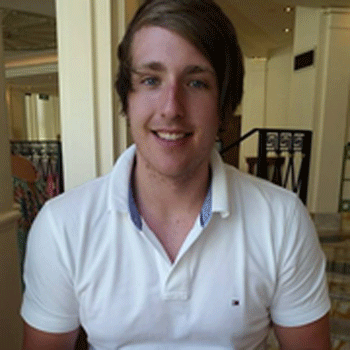Jake Lindardon Self-Help Intervention For Disordered Eating Interview

Jake Lindardon Self-Help Intervention For Disordered Eating Interview
A new investigation into the treatment of disordered eating is focusing on self-help as a more efficient and cost effective way of addressing an issue affecting at least 20 per cent of Australian young people.
Disordered eating including binge eating, emotional eating, consistent overeating, or yo-yo dieting has more than doubled since the early 90s.
Chief researcher Jake Linardon, PhD candidate at Australian Catholic University (ACU), said disordered eating stands in the way of emotional, social and physical development, and prevents people from living a full life.
Individuals exhibiting disordered eating often do not receive current evidence-based treatments, Linardon's findings show.
Reasons for this include: an insufficient number of therapists who are adequately trained in evidence-based treatments for disordered eating; and health insurance schemes not typically providing enough cover for the necessary treatments.
Linardon is trialling a program to address thoughts and behaviours about eating and weight before they develop into an eating disorder.
'We are looking for a more effective way for people to address problematic behaviours while at the same time promoting general self-acceptance, which will have an impact on their day to day wellbeing," he said.
'This is a group of people who probably wouldn't normally access treatment, but available research suggests they can achieve significant improvements with minimal therapist input."
Providing these evidence-based treatments in a guided self-help format, and showing that these treatments are beneficial and effective for this population, will make a real difference.
'Guided self-help programs can be delivered by training a range of health professionals. They are typically shorter than traditional therapist-led treatments, requiring only eight-10 sessions and are therefore more affordable," Linardon said.
'People will be coached through the program and helped to develop skills they can continue using independently after the program has finished.
'It is about empowering people to help themselves and live healthier, happier lives."
Ultimately, demonstrating that these programs are effective will go a long way toward improving the health of a significant portion of the population.
To do that Linardon is looking for people to participate in the next stage of his study.
Anyone over the age of 18 living in Melbourne who experiences one or more of following: recurrent binge eating (i.e., eating a large amount of food given the circumstances, and feeling like it is out of control), emotional eating, consistent overeating, or yo-yo dieting tendencies is invited to be involved. Men and women are both encouraged to take part. Participation is free.
A provisional psychologist will be assigned to each participant to help guide them through an eight-week program.
Individuals with serious eating disorders (i.e., anorexia nervosa, bulimia nervosa) or individuals with serious psychiatric illness (e.g., schizophrenia, personality disorders) will not be included in the study.
For more information visit: http://www.breakbingeeating.com
Australian Catholic University is Australia's only truly national university with campuses in Sydney, Melbourne, Canberra, Brisbane, Ballarat, Adelaide and Rome.
Disordered eating including binge eating, emotional eating, consistent overeating, or yo-yo dieting has more than doubled since the early 90s.
Chief researcher Jake Linardon, PhD candidate at Australian Catholic University (ACU), said disordered eating stands in the way of emotional, social and physical development, and prevents people from living a full life.
Individuals exhibiting disordered eating often do not receive current evidence-based treatments, Linardon's findings show.
Reasons for this include: an insufficient number of therapists who are adequately trained in evidence-based treatments for disordered eating; and health insurance schemes not typically providing enough cover for the necessary treatments.
Linardon is trialling a program to address thoughts and behaviours about eating and weight before they develop into an eating disorder.
'We are looking for a more effective way for people to address problematic behaviours while at the same time promoting general self-acceptance, which will have an impact on their day to day wellbeing," he said.
'This is a group of people who probably wouldn't normally access treatment, but available research suggests they can achieve significant improvements with minimal therapist input."
Providing these evidence-based treatments in a guided self-help format, and showing that these treatments are beneficial and effective for this population, will make a real difference.
'Guided self-help programs can be delivered by training a range of health professionals. They are typically shorter than traditional therapist-led treatments, requiring only eight-10 sessions and are therefore more affordable," Linardon said.
'People will be coached through the program and helped to develop skills they can continue using independently after the program has finished.
'It is about empowering people to help themselves and live healthier, happier lives."
Ultimately, demonstrating that these programs are effective will go a long way toward improving the health of a significant portion of the population.
To do that Linardon is looking for people to participate in the next stage of his study.
Anyone over the age of 18 living in Melbourne who experiences one or more of following: recurrent binge eating (i.e., eating a large amount of food given the circumstances, and feeling like it is out of control), emotional eating, consistent overeating, or yo-yo dieting tendencies is invited to be involved. Men and women are both encouraged to take part. Participation is free.
A provisional psychologist will be assigned to each participant to help guide them through an eight-week program.
Individuals with serious eating disorders (i.e., anorexia nervosa, bulimia nervosa) or individuals with serious psychiatric illness (e.g., schizophrenia, personality disorders) will not be included in the study.
For more information visit: http://www.breakbingeeating.com
Australian Catholic University is Australia's only truly national university with campuses in Sydney, Melbourne, Canberra, Brisbane, Ballarat, Adelaide and Rome.
Interview with Jake Lindardon
Question: Can you tell us about Australian Catholic Universities (ACU) investigation into the treatment of disordered eating?
Jake Lindardon: At ACU, we are conducting a research trial that aims to compare the effectiveness of two psychological guided interventions for disordered eating. In particular, participants will be randomly allocated to one of two, 8 week psychological interventions. One of the interventions draws from a cognitive-behavioural framework, while the other intervention draws from a health at every size framework. Both of the interventions are guided in nature, which means that the therapist facilitates, rather than directs or leads, the client through the structured program we have set in place. We are always looking for more participants – male or female – to take part in this study.
 Question: How is self-help a more efficient and cost effective way of addressing disordered eating?
Question: How is self-help a more efficient and cost effective way of addressing disordered eating?
Jake Lindardon: Self-help essentially means that the participant takes home a standardized treatment manual and works through it more or less independently. Self-help programs are actually recommended by Australian and international treatment guidelines as a 'first-step" in treatment for those who have difficulty controlling their eating, weight or shape. This is because self-help programs can be implemented by a range of health care providers (e.g., provisional psychologists, nurses) with minimal experience. This is crucial, as the single most important barrier that prevents people from receiving evidence-based disordered eating treatments is the shortage of therapists who are adequately trained in these treatments. In addition, standard treatment programs typically last for 20 or more sessions. In Australia, however, health insurance schemes only cover around 10-12 sessions, meaning that many people will be out-of-pocket. Guided self-help programs, on the other hand, typically include 8-12 guided sessions and are significantly cheaper than traditional psychotherapy. Finally, guided self-help programs allow individuals to engage in therapy at a time, location, and place of convenience, thereby minimising potential obstacles to accessing treatment, such as distance from treatment clinics or practical difficulties attending appointments
Question: What is involved in your study? There a few steps involved for interested participants. First, people will typically express their interest via email (see below). They will then be contacted via the telephone by the student researcher to (a) determine their eligibility for the study; (b) provide more information about process involved. Those who are still interested will be offered an initial interview/assessment/session with our psychology intern who is working out of the Clinic for Healthy Eating and Weight (CHEW) at ACU. This interview/assessment aims to (a) determine whether the program is going to be suitable or beneficial to the client, and (b) help the client and intern develop rapport, and discuss goals for the program. If eligibility is further met, then the client will be randomized to one of the two groups. In each group, the client will receive a copy of the book that contains the steps and serves the basis for the program. Clients are informed on what topics are covered at each week. Both the client and intern then discuss suitable times for their, 8 free weekly sessions. Each session lasts about 40-50 minute each.
Question: How common is disordered eating in young Australians?
Jake Lindardon: Disordered eating is very common in young Australians. Recent data suggests that the prevalence of disordered eating behaviours (i.e., binge eating, extreme dieting, purging) has more than doubled since the early 1900's. At present, it is estimated that at least 16% of the Australian population exhibit some form of disordered eating behaviour or extreme concerns with body weight and shape.
Question: Can you share some information about disordered eating?
Jake Lindardon: Disordered eating is a significant problem in Australia. In particular, not only is the onset of disordered eating behaviour or concerns with shape and weight the most powerful predictor of the development of clinically significant eating disorders, but disordered eating is associated with numerous psychological impairments. For instance, disordered eating has been consistently linked to reduced quality of life, elevated levels of depression and anxiety, interpersonal conflict, and, in extreme cases, higher rates of suicide. For these reasons, it is crucial that we have effective interventions set in place that (a) can prevent the onset of eating disorders and (b) eliminate or at least significantly reduce these problematic behaviours. There has been remarkable progress toward developing effective interventions for disordered eating, and some of the more commonly used and effective disordered eating interventions include cognitive-behavioural therapy, family-based therapy, and interpersonal psychotherapy.
Question: What do you hope to achieve from this investigation?
Jake Lindardon: From this project, we hope that we can improve the dissemination of evidence-based interventions designed to treat disordered eating. For example, previous research has shown that only 23% of individuals exhibiting disordered eating receive some form of treatment. These low numbers can be partially explained by (a) the cost of treatment and (b) the lack of access to treatment. Consequently, by showing that these low-cost programs are successful and effective, we believe that it can go a long way toward helping many more young Australians receive these interventions and ultimately help them overcome these problems.
Question: What advice do you have for young Australians who suspect their friend or family member may have disordered eating?
Jake Lindardon: Given the secrecy associated with disordered eating behaviours, it is sometimes hard to tell whether someone is dealing with issues like this. However, there are certain things people can do to help loved ones who might be dealing with issues like these. For example, it is not helpful for you to make comments about their appearance or weight – this only fuels extreme dieting behaviour and the preoccupation with eating, weight and shape. In addition, it is important that you set a positive example. In particular, you should focus on eating a well-balanced diet and show respect for your own body – this pattern of thinking and acting is contagious. Finally, make meal time fun. Use meal times to socialize or meet other people. Take the emphasis away from 'calories in" and onto positive social interactions that will enhance self-esteem.
Question: How can Australians aid in the study?
Jake Lindardon: If you know anyone that might benefit from this program, please pass on the following email: Jake.linardon@acu.edu.au. The more people we can recruit, the more powerful our findings will be and the greater the likelihood of improving the delivery of these types of interventions in Australia.
Interview by Brooke Hunter
Jake Lindardon: At ACU, we are conducting a research trial that aims to compare the effectiveness of two psychological guided interventions for disordered eating. In particular, participants will be randomly allocated to one of two, 8 week psychological interventions. One of the interventions draws from a cognitive-behavioural framework, while the other intervention draws from a health at every size framework. Both of the interventions are guided in nature, which means that the therapist facilitates, rather than directs or leads, the client through the structured program we have set in place. We are always looking for more participants – male or female – to take part in this study.
 Question: How is self-help a more efficient and cost effective way of addressing disordered eating?
Question: How is self-help a more efficient and cost effective way of addressing disordered eating? Jake Lindardon: Self-help essentially means that the participant takes home a standardized treatment manual and works through it more or less independently. Self-help programs are actually recommended by Australian and international treatment guidelines as a 'first-step" in treatment for those who have difficulty controlling their eating, weight or shape. This is because self-help programs can be implemented by a range of health care providers (e.g., provisional psychologists, nurses) with minimal experience. This is crucial, as the single most important barrier that prevents people from receiving evidence-based disordered eating treatments is the shortage of therapists who are adequately trained in these treatments. In addition, standard treatment programs typically last for 20 or more sessions. In Australia, however, health insurance schemes only cover around 10-12 sessions, meaning that many people will be out-of-pocket. Guided self-help programs, on the other hand, typically include 8-12 guided sessions and are significantly cheaper than traditional psychotherapy. Finally, guided self-help programs allow individuals to engage in therapy at a time, location, and place of convenience, thereby minimising potential obstacles to accessing treatment, such as distance from treatment clinics or practical difficulties attending appointments
Question: What is involved in your study? There a few steps involved for interested participants. First, people will typically express their interest via email (see below). They will then be contacted via the telephone by the student researcher to (a) determine their eligibility for the study; (b) provide more information about process involved. Those who are still interested will be offered an initial interview/assessment/session with our psychology intern who is working out of the Clinic for Healthy Eating and Weight (CHEW) at ACU. This interview/assessment aims to (a) determine whether the program is going to be suitable or beneficial to the client, and (b) help the client and intern develop rapport, and discuss goals for the program. If eligibility is further met, then the client will be randomized to one of the two groups. In each group, the client will receive a copy of the book that contains the steps and serves the basis for the program. Clients are informed on what topics are covered at each week. Both the client and intern then discuss suitable times for their, 8 free weekly sessions. Each session lasts about 40-50 minute each.
Question: How common is disordered eating in young Australians?
Jake Lindardon: Disordered eating is very common in young Australians. Recent data suggests that the prevalence of disordered eating behaviours (i.e., binge eating, extreme dieting, purging) has more than doubled since the early 1900's. At present, it is estimated that at least 16% of the Australian population exhibit some form of disordered eating behaviour or extreme concerns with body weight and shape.
Question: Can you share some information about disordered eating?
Jake Lindardon: Disordered eating is a significant problem in Australia. In particular, not only is the onset of disordered eating behaviour or concerns with shape and weight the most powerful predictor of the development of clinically significant eating disorders, but disordered eating is associated with numerous psychological impairments. For instance, disordered eating has been consistently linked to reduced quality of life, elevated levels of depression and anxiety, interpersonal conflict, and, in extreme cases, higher rates of suicide. For these reasons, it is crucial that we have effective interventions set in place that (a) can prevent the onset of eating disorders and (b) eliminate or at least significantly reduce these problematic behaviours. There has been remarkable progress toward developing effective interventions for disordered eating, and some of the more commonly used and effective disordered eating interventions include cognitive-behavioural therapy, family-based therapy, and interpersonal psychotherapy.
Question: What do you hope to achieve from this investigation?
Jake Lindardon: From this project, we hope that we can improve the dissemination of evidence-based interventions designed to treat disordered eating. For example, previous research has shown that only 23% of individuals exhibiting disordered eating receive some form of treatment. These low numbers can be partially explained by (a) the cost of treatment and (b) the lack of access to treatment. Consequently, by showing that these low-cost programs are successful and effective, we believe that it can go a long way toward helping many more young Australians receive these interventions and ultimately help them overcome these problems.
Question: What advice do you have for young Australians who suspect their friend or family member may have disordered eating?
Jake Lindardon: Given the secrecy associated with disordered eating behaviours, it is sometimes hard to tell whether someone is dealing with issues like this. However, there are certain things people can do to help loved ones who might be dealing with issues like these. For example, it is not helpful for you to make comments about their appearance or weight – this only fuels extreme dieting behaviour and the preoccupation with eating, weight and shape. In addition, it is important that you set a positive example. In particular, you should focus on eating a well-balanced diet and show respect for your own body – this pattern of thinking and acting is contagious. Finally, make meal time fun. Use meal times to socialize or meet other people. Take the emphasis away from 'calories in" and onto positive social interactions that will enhance self-esteem.
Question: How can Australians aid in the study?
Jake Lindardon: If you know anyone that might benefit from this program, please pass on the following email: Jake.linardon@acu.edu.au. The more people we can recruit, the more powerful our findings will be and the greater the likelihood of improving the delivery of these types of interventions in Australia.
Interview by Brooke Hunter
MORE





